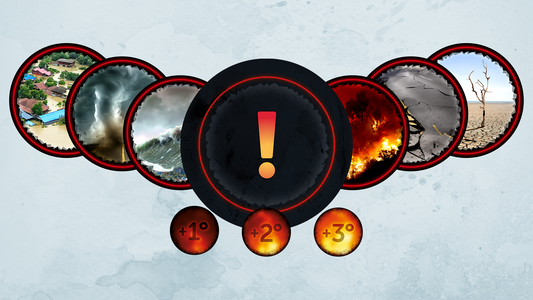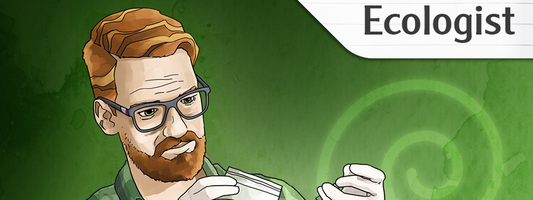//This Dev Blog was originally posted as an update on the Earth Rising Kickstarter on September 22nd, 2021//
In Earth Rising, there are times when things just don’t go to plan. The Influence cards aren’t what you hoped, ending up with the wrong people at the wrong times, and there aren’t enough actions to help enough sectors, Strain is building up and then… the Status Quo Strike exactly where you hoped they wouldn’t.
There’s plenty of factors that can lead to an Ecological Collapse, but in the end, once fifteen Strain accumulates across both the minor and major burdens of a particular type, there’s no averting disaster.

But what does this mean? An ecological disaster in Earth Rising lasts forever, yet that’s not the same as real life, is it?
The Ultimate Game Over
There’s two parts to an Ecological Collapse in Earth Rising. The first part is the placement of a collapse token itself, which shows the disaster on its surface, but the second and arguably more important part is the Rising Temperature token, which represents our planet exceeding its first degree beyond its natural temperature.
Combined, these tokens show a decline in the capacity of our planet, and the effects resonate across the board.
First you have the sector where a collapse token is placed limited by one circle, making it harder to support your people, and impossible to support as many as before. This also guarantees a minimum of one ‘people’ token in poverty for good, as they will never be able to inhabit that circle.
Finally, you have the Rising Temperature token adding one additional Strain during the Poverty Strain phase, meaning no matter what you will always have Strain to deal with, no matter how well you’ve overcome future problems.

The message behind these mechanics is simple: undoing damage is far harder than changing our world before it’s too late, and if we don’t do what we need to before it’s too late, the task ahead of us will only become harder.
This message is a grim one, and difficult to engage with, which leads me to the second part of this dev blog, and the primary force behind Earth Rising…
Before We Change Our World, We First Have To Change Our Message
It’s been recognised by sociologists for over 20 years that, beginning with the advent of television, news reporting has become more focused on fear than ever before. While this was significantly exacerbated by the aftermath of the World Trade Centre attack, it was recognised much earlier, with the above paper ending its abstract with the message:
“No passion so effectually robs the mind of all its powers of acting and reasoning as fear.” - Edmund Burke
We can see this play out ever since, with the recent Pandemic displaying its efficacy in what messages compel people to act or retreat and deny. In this TED talk by Psychologist and Environmental Engagement Strategist Renée Lertzman she talks about how when we endure a high amount of stress we retreat into a state of disengagement and, eventually, denial and anger. This state has been increasing throughout the climate crisis, and as I discussed in my blog post about how Earth Rising started, I was once in this “beyond my threshold” state myself.
But we can change it. She goes on to state how we can reframe our message, and change the challenge ahead of us in the minds of others.

In her article on Tackling Apathy and Denial, she explains that by looking at the way the human mind takes information in, we can better orientate our message to be something that inspires people to want to act, and when enough people act, we can accomplish anything.
Through her research, she found that instead of trying to motivate people to act, we need to empower them to act. Most people already want to do something about our crisis, but feel as though they are unable to make any impact.
Then, even if they feel empowered, they need to know what to do, with a clear understanding of the effects we will have if we engage with those solutions.
Finally, and this is a critical element to climate activism, we need to show people that their reasons for acting should not necessarily be out of fear of a worse world, but out of empathy for those who will suffer from our crisis, whether or not they believe they will be included in that suffering.
Earth Rising Is Designed To Be Exactly What We Need
I hadn’t read her article before I designed Earth Rising, but to my surprise and delight I realised it reflected everything she felt our message should become.
By putting you in the position of our specialists, we seek to empower you and give you the feeling that you have a direct hand in changing our world. By putting you in that position, you interact with both Unsustainable practices, engaging with what needs to change, and transitioning them to Sustainable alternatives to make our world better.
Finally, by including poverty as a central element, we hope to bring a sense of empathy towards those who will suffer from our climate crisis, and give you an emotional reason to work hard and together to make our world and society a better place.

This, combined with the information included in our informational booklet, is what we hope will spur people on to look at our climate crisis from a different perspective - turning away from fear and towards a positive, hopeful, and determined outlook.
Every time you win the game, your fear-infused brain will take in the message, however quiet at first, that we can overcome this. Even when you lose, you can see how far you’ve come, and how well we can do in just 20 years.
In this way, we hope that Earth Rising will be part of a growing movement to look at the real life disasters that are increasingly generated across our world, and instead of feeling afraid, feel ever more inspired to be part of the change that’s needed.





